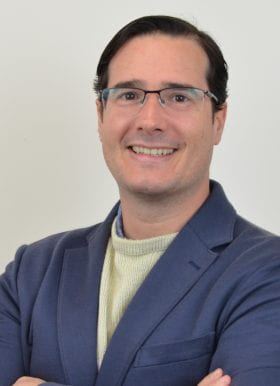
Carlos Cruchaga, PhD
Director, NeuroGenomics and Informatics Center
- Phone: 314-286-0546
- Fax: 314-362-2244
- Email: cruchagac@wustl.edu
Dr. Cruchaga is the Barbara Burton & Reuben Morriss III Professor of Psychiatry with joint appointments at Genetics, and Neurology at Washington University School of Medicine.
Dr. Cruchaga is a human genomicist with expertise in multiomics, informatics, and neurodegeneration. He completed his PhD in Biochemistry and Molecular Biology in 2005 at the University of Navarra in Spain. During his first postdoc with Dr. Pastor he conducted statistical human genetics studies focused on Alzheimer’s disease (AD) and Parkinson’s disease (PD). He then moved to Dr. Goate’s Lab to complete his training in quantitative human genomics. Dr. Cruchaga established his laboratory at Washington University in 2011 to study the genetic architecture of neurodegenerative diseases. His interests are focused on using human genomic and other -omic data (proteomics, metabolomics, and lipidomics) to identify and understand the biological processes that lead to AD, PD, frontotemporal dementia, and other neurodegenerative processes. He is the founding director of the NeuroGenomics and Informatics Center at Washington University.
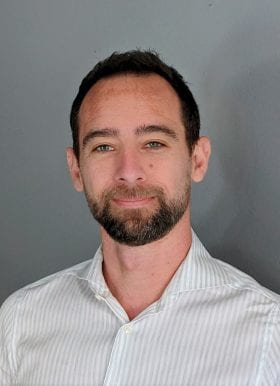
Cyril Pottier, PhD
Asst Prof of Neurology (PEFA), Neurology – Administration
- Phone: 314-747-2601
- Email: cpottier@wustl.edu
Cyril Pottier obtained his Ph.D. focused on the genetics of genetically unexplained young-onset Alzheimer’s disease (YOAD) in the laboratory of Dr. Campion in University of Rouen, France. His major contribution to the AD field was the identification of SORL1 as a potential causal gene for YOAD, publishing the first whole-exome study on YOAD patients. During his postdoctoral stay at Mayo Clinic Jacksonville, Florida within Dr. Rademakers laboratory, he discovered new risk factors, genetic modifiers and transcript alterations associated with frontotemporal lobar degeneration.
As Assistant Professor at Washington University, he is now focusing his work on identifying new genetic risk factors and modifiers of early onset dementia using integrative and innovative approaches. He has a strong interest in disease modifiers in patients with PSEN1 mutations and is currently combining whole genome sequencing with short and long read single-nuclei RNA sequencing to address the variable disease presentation problematic. He is leveraging a large set of whole genome sequencing data of neuropathologically confirmed as well as highly characterized clinical genetically unexplained YOAD patients to discover new risk genes, and variants that modify disease onset and other associated neuropathologic features.
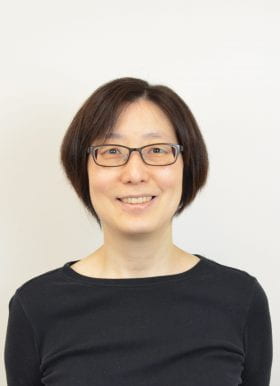
Yun Ju Sung, PhD
Associate Professor, Psychiatry and Biostatistics
- Email: yunju@wustl.edu
Dr. Sung has worked on several projects dealing with GWAS consortia, imputation of genotypes in various multi-ancestry family studies, analysis of sequence data, and analysis of rare variants using various statistical methods. To decipher the genetic and environmental architecture of cardiovascular disease traits, she worked on establishing the gene-lifestyle interactions working group within CHARGE and created robust infrastructure and analysis pipelines. Through gene-environment (GxE) interactions with six lifestyle factors (including smoking and physical activity) the group identified several loci showing biologic plausibility and clinical relevance for blood pressure and lipid homeostasis (Sung et al., American Journal of Human Genetics, 2018; Bentley et al., Nature Genetics 2019). Dr. Sung joined the NeuroGenomics and Informatics Center in 2020 and has worked on proteomics analysis using SOMAscan data to identify multi-tissue molecular signatures for Alzheimer disease (AD) and individuals with APP, PSEN1, PSEN2, and TREM2 risk variants.
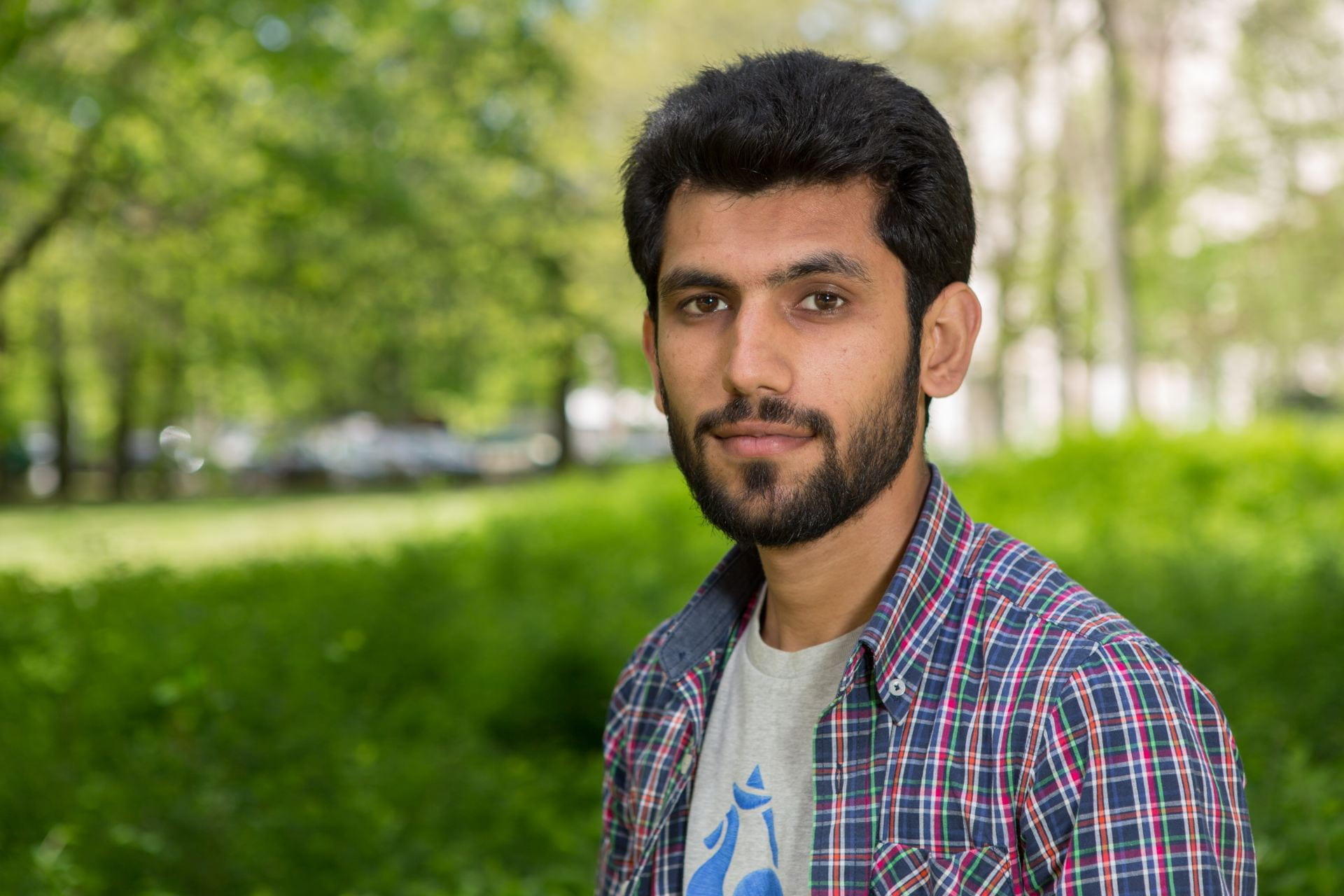
Muhammad Ali, PhD
Instructor in Psychiatry
- Email: m.ali@wustl.edu
Dr. Muhammad Ali is a bioinformatician by training. He has joined the Cruchaga lab at Washington University in St. Louis (WUSTL) as a postdoctoral research associate. His area of expertise is computational system biology, i.e. integrative analysis of multi-omics data from disease-related case-control studies, and network-based predictive disease modeling. In Cruchaga Lab, he is expanding his knowledge in the area of human genetics and performing genome-wide association studies (GWAS) analysis to identify novel and common genetic variants associated with neurodegenerative disorders. He aims at utilizing the multi-omics data from human brain tissues for identifying novel genes implicated in AD, to provide biological context for the risk genes and to identify novel molecular biomarkers and new therapeutic targets.
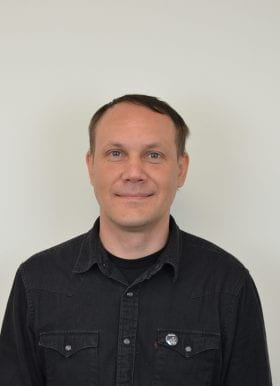
Niko Nykänen, PhD
Instructor, Psychiatry
- Email: nnykanen@wustl.edu
Niko is a molecular and cellular neurobiologist with a strong interest and background in neurodegenerative disorders. He obtained his PhD in physiology and neuroscience from University of Helsinki, Finland. For his PhD he investigated cellular and molecular mechanisms of Alzheimer disease (AD) by studying the protein-protein interactions of known disease-associated proteins involved in the pathophysiology of AD primarily focusing on microtubule-associated protein tau. He did his first postdoctoral training at the German Center for Neurodegenerative diseases, Munich, Germany, where he studied the molecular mechanisms of transcellular spreading of tau and alpha-synuclein in relation to known disease-specific risk genes in tauopathies and synucleinopathies. Niko joined Dr. Benitez’s lab at NGI, Washington University, for his second postdoctoral training in 2020 where he focused on functional genomics of AD and Parkinson’s disease (PD). Currently, working in the Cruchaga lab, he is utilizing various disease models to functionally characterize novel genes and pathways in AD and PD discovered by genetic studies

Dario Maschi, PhD
Assistant Professor of Psychiatry
- Email: dario.maschi@wustl.edu
Dr. Maschi, a neurobiologist, combines his passion for understanding synaptic transmission with advanced biophysical techniques. His research primarily focuses on the mechanisms of synaptic function and dysfunction in healthy and diseased states, spanning molecular, cellular, and circuit levels.
Dr. Maschi completed his B.S. and Ph.D. in Neuroscience at the University of Buenos Aires, supported by a National Council for Scientific and Technological Research fellowship. His doctoral work focused on RNA-binding proteins and their role in synaptic plasticity. He used Deconvolution Microscopy for 3D reconstruction of dendritic spines and developed computational tools for their analysis.
Dr. Maschi joined Washington University for his postdoctoral training, supported by a McDonnell Center for Cellular & Molecular Neurobiology fellowship. He developed a computationally intensive nanoscale microscopy technique that precisely locates single vesicle fusion events at synaptic active zones. This technique has enabled groundbreaking insights into synaptic transmission mechanisms, revealing the complex dynamics of neurotransmitter release. In addition, Dr. Maschi applies custom-trained deep learning models to study the structural aspects of neurons through electron microscopy, contributing to the structural recognition and classification of data sets.
Currently, as an Assistant Professor of Psychiatry, Dr. Maschi remains committed to advancing our understanding of neurodegenerative diseases and leads innovative research in synaptic physiology to explore early synaptic changes that could trigger neuropathologies, including Alzheimer’s disease.